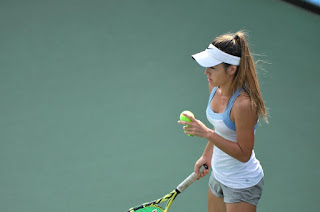BE CAREFUL WHAT YOU SAY!
A coach can only do so much with a player who is experiencing destructive mental issues related to tennis competition.
Players who find competition mentally too much to handle and suffer from choking, low levels of self-confidence or an inability to close out important matches are generally the victims of their environment. They reflect the environment they live in daily when they compete in matches.
Prolonged and repeated negative mental issues in matches when competing as a junior player also continue to be a problem for the player much later in life, even though the environment that caused the mental issues in the first place might have changed for the better.
Considering a majority of competitive junior players suffer from an almost crippling mental war inside their heads, it would be fair to say that this is why a majority of players never fully reach their true potential.
It, therefore, becomes clear that the environment we grow up in when we start our tennis is critically important.
Coaches can sometimes merely inherit the mental problems of their students, although in some cases, coaches actually add to, or at worst, create negative mental issues.
Therefore, this article is for parents and coaches who need help understanding how to prevent their child or student from developing mental issues related to competition in the first place. It can also be a reference for how to handle players who have already developed issues mentally and, ultimately, how to reverse the problem.
A father recently messaged me while going to a tournament with his son. They were on their way to play the first day of the Nationals.
The stress in the car must have been considerable because his son had asked his father "What if I lose"?
His father had messaged me asking, "What should I tell him"?
The most important thing for Parents and Coaches to remember is that in order to play at their best a player must enjoy the process of playing. Enjoyment unlocks the mind and allows you to perform to your potential. Any form of mental contamination will hurt your performance.
The root causes of contamination are broad but can include unrealistic expectations, unrealistic pressure, low self-esteem, low self-confidence, and fear.
In my experience, young players pick most of this up from the people they want to please the most, parents and coaches. It is, therefore, important to know now that what you say as a parent or a coach becomes extremely powerful... the emotion you send to a young player within your comments is magnified 6 times!
IF YOU THINK THE SUBTLE COMMENT YOU JUST MADE WAS NO BIG DEAL, MAGNIFY IT BY SIX TIMES... NOW TELL ME IT WON'T HURT OR PUT EXTRA STRESS ON THE CHILD!
I consciously prepare myself to react to situations around players. I prepare my words and reactions for possible instances in the future. I'm ready.
I also react to questions or situations in the third person. Often I observe myself speaking to a player from the third person's perspective, monitoring my words, tone, and body language. Often we fail to recognise how our tone or body language is coming across to others.
Timing is important. Don't bring up possible stressful topics around stressful times, before or after matches, for example. I'm not saying tough topics can't be discussed. I'm saying be smart when you bring them up.
DEVELOP EMPATHY FOR YOUR CHILD OR STUDENT
Parents often ask me what they can do to make a real difference in their child's tennis. By monitoring how you act and what you say around your child, you can create an environment that fosters a happy, competitive player. This is the single most crucial ingredient in developing a successful player.
With enough awareness and empathy, you can also correct unwanted behavioural problems that have already developed.





%20copy.png)

Comments
Post a Comment